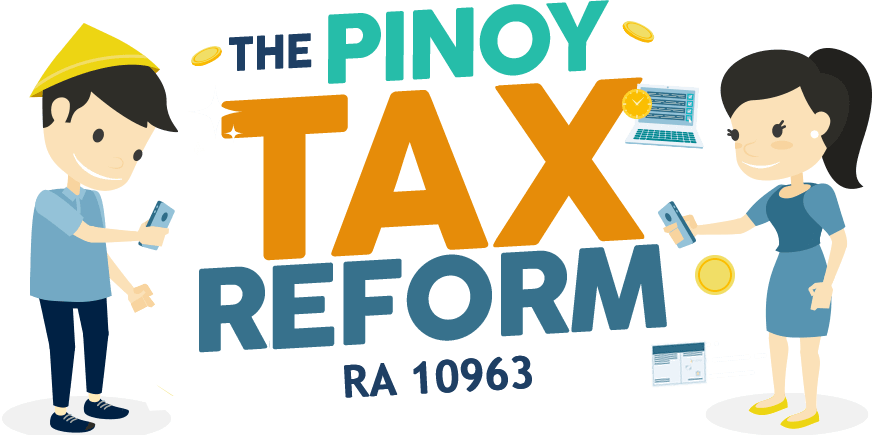What is TRAIN BILL for Professionals?
Over a year into President Rodrigo Duterte’s administration, the plans for Dutertenomics’ Build,
Build, Build infrastructure program has finally commenced. The socioeconomic agenda, which
features a promising vision of yielding robust growth across the Philippines, however needs
appropriate funds in order to be successful. To address this, President Duterte has signed into
law the Tax Reform for Acceleration and Inclusion (TRAIN) bill, which is visualized to generate
P130 million in revenues.
Set to be implemented this January 2018, the TRAIN bill envisions to progress the country’s
current low middle-income status to upper middle-income status. It seeks to correct a number
of deficiencies in the tax system to make it simpler, fairer, and more efficient—according to
Department of Finance (DOF).
Included in this agenda is the provision of equal opportunities for every Filipino, which covers
lesser burden on tax for Self Employed and Professionals.
Tax Reform for Acceleration and Inclusion (TRAIN) for Self Employed and Professionals (SEP)
The old tax code does not favor the self-employed and professionals. As contributors to our
economy, SEPs—particularly small business owners, are rightly entitled to be given a boost and
put in the heart of our economy. To make this change possible, TRAIN introduces an optional
flat tax or a single rate of income tax to aid SEPs.
In the previous tax code, SEPs pay income tax at the same five to thirty-percent income tax
schedule. However, with the new program, those with gross sales or gross receipts that do not
go over the new value-added tax (VAT) threshold of ₱3,000,000 have the option to either use,
(a) the new Personal Income tax schedule shown below, or (b) an eight percent flat tax on gross
sales or receipts exceeding ₱250,000. In choosing the eight percent flat tax, they will be exempt
from the three percent percentage tax. Regardless of their choice, SEPs whose gross sales or
receipts do not exceed ₱500,000 will be exempt from the three percentage tax.
Personal Income Tax Schedule (Under TRAIN bill)
| Annual Salary | Tax Schedule (2018-2022) | Tax Schedule (2023 onwards) |
|---|---|---|
| Not over P250,000 | Exempted | Exempted |
| Over P250,000 but not over P400,000 | 20% of the excess over P250,000 | 15% of the excess over P250,000 |
| Over P400,000 but not over P800,000 | P22,500 + 20% of the excess over P400,000 | |
| Over P800,000 but not over P2 million | P130,000 + 30% of the excess over P800,000 | P102,500 + 25% of the excess over P800,000 |
| Over P2 million but not over P8 million | P490,000 + 32% of the excess over P2 million | P402,500 + 30% of the excess over P2 million |
| Over P8 million | P2,410,000 million + 35% of the excess over P8 million | P2,202,500 + 35% of the excess over P8 million |
Common Issues/Scenarios:
Scenario 1
Based on the previous year sales/receipts, a purely self employed VAT registered individual/professional expects to earn Php 2.5 million as gross sales in 2018 – below the new VAT threshold of Php 3 million.
Issue # 1: Do I continue to be a VAT registered?
Opinion: Yes. If the you want to be Non-VAT registered, then there is a need to change your registration with the BIR. As per the BIR advisory, purely self-employed VAT registered individuals/professionals have until March 31, 2018 to change their VAT status to Non-VAT.
Issue # 2: If I change my VAT status to Non-VAT, do I need to change my OR/Invoice to Non-VAT?
Opinion: I think you would have to surrender all your unused OR/Invoice to the BIR and apply for printing of a new set of OR/Invoice as Non-VAT person.
Issue # 3: If I continue to be VAT registered and be exempt from VAT, should I issue a VAT-Exempt OR?
Opinion: Yes. As per TRAIN law, gross sales/receipts of Php 3 million and below is exempted from VAT. However, you would have to issue a VAT-Exempt OR to your customers/clients. As such you still need to file VAT Declarations/Returns (2250M/Q) monthly.
It is my opinion that failure to issue a VAT-Exempt OR will make you liable to pay VAT.
Issue # 4: If I continue to be VAT registered and be exempt from VAT, can I claim my input tax as tax credit?
Opinion: It is in my opinion that you will not be able to claim your input VAT from your purchases if you issue a VAT-Exempt OR for your sales. As a VAT registered person, you may, however, claim it as part of your expense, but not input tax credit.
Issue # 5: If I continue to be VAT registered and be exempt from VAT, will I be liable to pay 3% other percentage tax?
Opinion: Section 38 of the TRAIN law amends Section 116 of NIRC. It says “Any person whose sales or receipts are exempt under Section 109 (BB) of this Code from payment of Value added tax AND who is not VAT registered shall pay 3% of his gross quarterly receipts/sales”.
The operative word is “and”. Since you are exempt under Section 109 (BB) and is VAT registered, then by deduction, you are NOT liable to pay the 3% other percentage tax.
Issue # 6: If at the end of the year my total gross receipt exceeds the Php 3 million threshold, should I pay VAT?
Opinion: Yes. You may amend all your VAT declarations/returns. However, the problem with this method is that you might be charged with penalties (surcharge and interest) for incorrect filing.
In my opinion, to avoid penalties, you may pay your VAT using Form 0605.
References:
Disclaimer: New and subsequent BIR rulings, issuances and/or laws may render the whole or part of the article obsolete or inaccurate. For more information, please inquire or consult with the BIR.
Author





